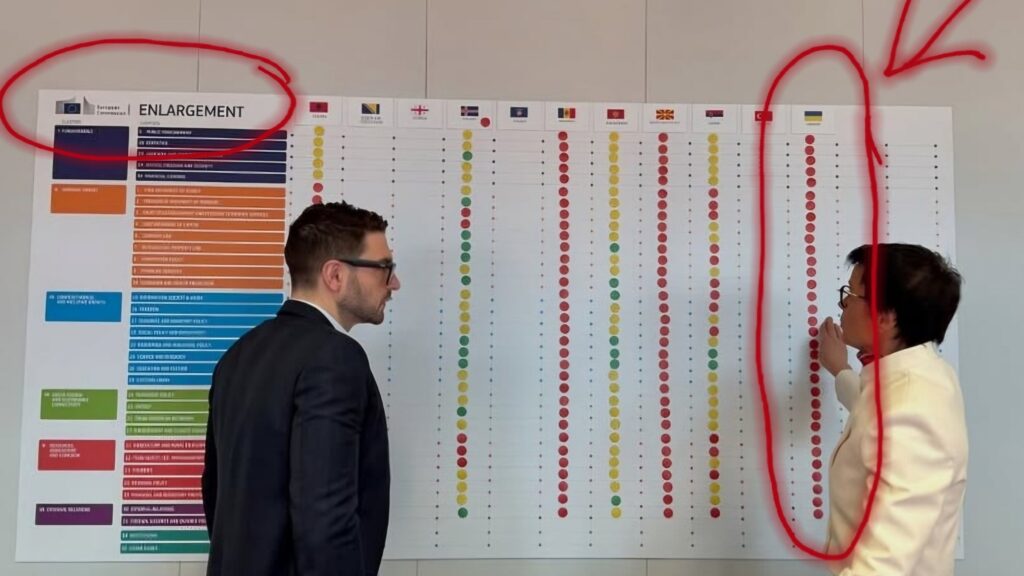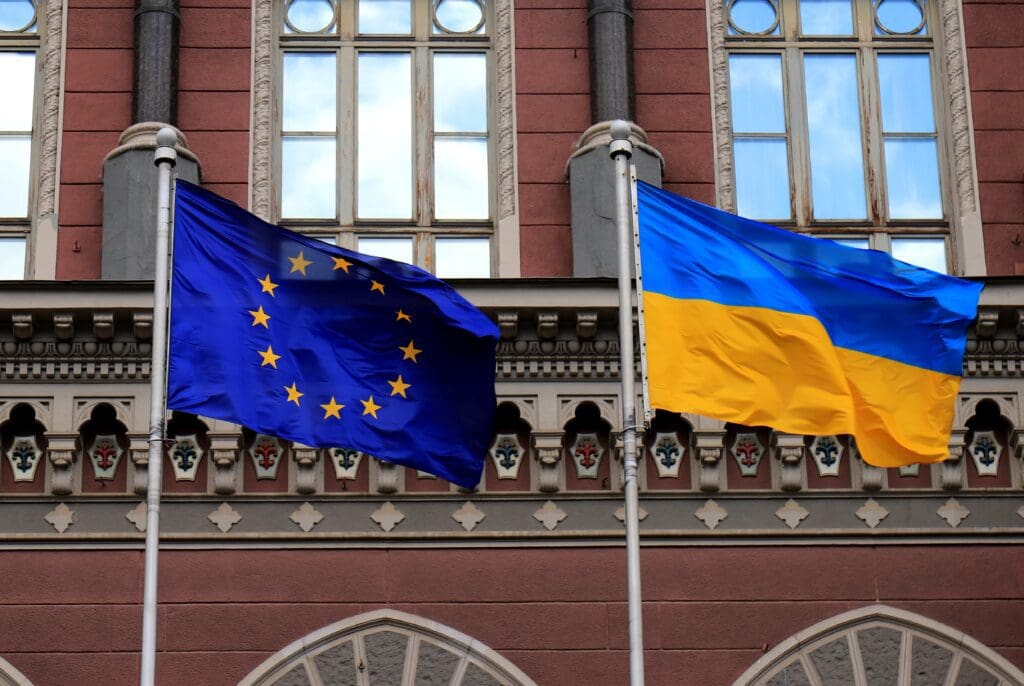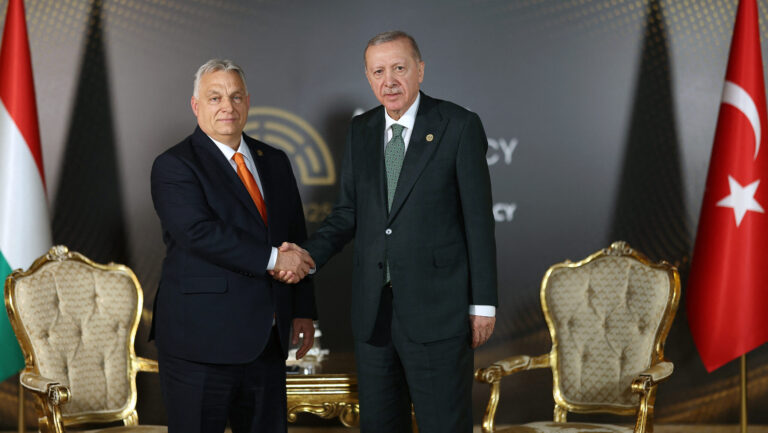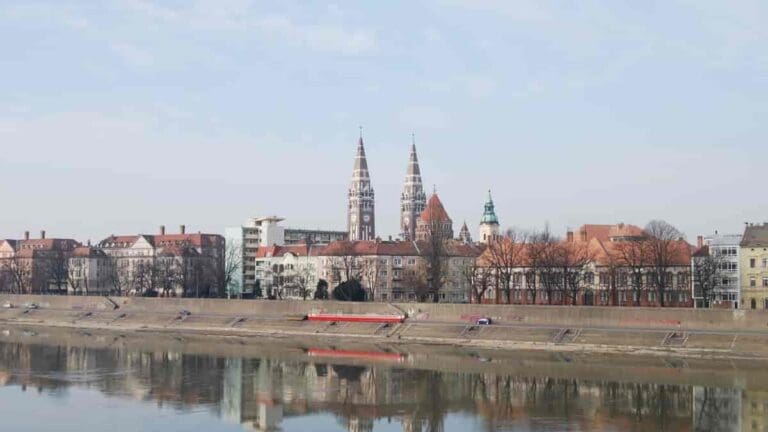At the latest event of the Speaker Series organized by the New York Young Republicans Club (NYYRC), Hungarian Minister of Culture and Innovation Prof. Dr. Balázs Hankó spoke about the significant roles that culture, technology and diplomatic engagements play in shaping Hungary’s international standing and domestic growth, sharing insights on the successes, challenges, and strategies that define Hungary’s approach to innovation and cultural diplomacy. After explaining how small but old European nations, like Hungary, are navigating the complex web of global challenges through innovation and strategic cultural outreach, the minister answered several questions from the audience.
The Hungarian minister started his presentation by outlining his vision of a bright future because, in his opinion, Hungary is at the heart of Europe; when the heart is normal, there is a chance that the whole body will heal and be normal. That’s why it’s so important that the U.S. and Hungary have such a strong alliance, because together they can change the world to be normal, advancing pro-life and pro-family policies all over the world. He continued explaining the unique features of his department, covering several different matters, including higher education, vocational training, adult training as well as research and innovation in science—and related policies, including the by now world-famous Hungarian family policies, adding: these all relate to the national identity, because culture means identity.
‘He continued explaining the unique features of his department, covering several different matters…because culture means identity’
When briefly summarizing Hungarian history and the reasons why it’s so important for Hungarians and for those who want to understand them, Prof. Hankó highlighted two key concepts coded in Hungarian history: fights for freedom and sovereignty. ‘Hungarians are a little bit different: we are coming from the East and settled down in the heart of Europe, in the Carpathian Basin in the ninth century, with a unique language, a unique culture, and a unique history. Our national history is more than 1,000 years old, and we have survived because we are freedom fighters and we very much appreciate sovereignty. We respect other nations, especially strong nations with strong identity, but we want it to be mutual: we expect other nations to respect our nation and our history, too.’
Highlighting the reasons why freedom is important for Hungarians, he shared that Hungary was occupied by the Ottoman Empire for more than 150 years, then dominated by the Austrian Empire for several hundred years, and then was forced into the Treaty of Trianon, in which it lost two-thirds of its former territory. Then came more than 40 years of communist rule under the Soviet Empire, which was shaken by the 1956 Hungarian revolution and freedom fight. ‘As a result, nowadays some 2.5 million Hungarians live outside of the current borders of Hungary. It is very important for us to support them morally and financially, enabling them to protect, live and pass on our unique culture,’ the minister said. Quoting the famous Hungarian writer Sándor Márai, he explained that Western nations don’t necessarily appreciate how important freedom is, because they got it as a ‘gift’, while Hungarians had to fight for their freedom many times in their history. That’s what we are doing nowadays in Europe, he added, only because ‘we want peace and a normal life’.

Listing the major challenges Europe is facing, Prof. Hankó listed three key factors that Europe is currently losing: identity, competitiveness, and ability to reproduce itself. According to him, out of these, the core issue is identity because ‘if you lose your identity, you won’t be competitive, and won’t have the ability to reproduce yourself.’ The Hungarian minister drew attention to the fact that recent mass migration to Europe causes a rapid cultural change in multiple Western European countries; for example, in Germany, every third child, in France, every fourth child has an immigration background. Europe’s nations were built on classical Judeo–Christian culture. ‘Notice what is happening. Europe is now just a mess. We are losing our identity because of mass migration,’ he concluded.
Regarding economic competitiveness, the minister emphasized that while labor productivity in the U.S. and Europe was similar in 1995, nowadays, Europe is seriously lagging behind, reaching around 80 per cent of the U.S. labor productivity rate. Additionally, only four out of the world’s top 50 largest tech companies are European, which is only 8 per cent. As a third aspect, he mentioned the importance of venture capital, collaboration between industries and venture capital funds, stating that Europe’s share of global venture capital funding raised is only 5 per cent globally, while the U.S.’s share is 52 per cent, and China’s share is 40 per cent. Moreover, if we zoom in on pure research, the publication output of Europe has also declined: its current share is only 19 per cent globally, while East Asia boosts 32 per cent and North America adds around 15 per cent. ‘We are losing not only our culture, but also our competitiveness; we need cultural identity and an impact-driven science which is in line with our national economy,’ he summarized. He also mentioned that, based on a recent vote by the European Parliament, a European-funded research program called Horizon excluded Hungarian universities and researchers, but included the financial support of gender propaganda-related research.
‘We are creative. And we want to be a self-sustaining nation’
As regards demographic, Prof. Hankó stated that the current stagnation of European population is only due to recent mass migration, otherwise the decline is absolutely rapid: there are about 600,000 less ‘original’ Europeans each year, while in the past ten years, Europe received some 14 million new migrants, mostly from culturally very different Asian and African nations. Assuming no migration and calculating with the current fertility rate (i.e. assuming that it wouldn’t decline further), by 2100 Europe’s population would drastically decline, for example Germany would have approximately 50 instead of the current 80 million population, Poland’s population would decrease to 24 million instead of the current 40 million, etc. ‘We have to stop mass migration and increase the fertility rate to save our old continent. That’s why the Hungarian nation decided to stop illegal migration. As a result, we were imposed by the Brussels administration to pay a penalty of 1 million euros per day. We also want to protect our children from gender propaganda: the Hungarian child protection law prohibits gender activities in media accessible to minors under 18 and also prohibits gender activities in schools.’ Finally, the minister said, Hungary wants peace as soon as possible in the currently ongoing Russian–Ukrainian war for three reasons: almost 150,000 Hungarians live as minorities in Ukraine; Hungary is governed by Christian Democrat parties, and the war is a huge financial burden on the Hungarian economy. ‘So, we want to stop illegal migration, we want to protect our children, and we want peace,’ he summarized, adding that all these were decisions of the Hungarians. ‘There is good news for Hungarians and bad news for Brussels: Hungary is here to stay, because we are a special nation in the heart of Europe. We’ll survive because we are on the normal side, which is hard to conquer.’ ‘We are happy to have support from the U.S. in our battle with the European Union,’ he added.
In the second part of his presentation, Prof. Hankó presented several solutions currently applied in Hungary for the previously mentioned challenges that the whole of Europe, including Hungary, faces. ‘Being Hungarian is a privilege, a pride, and a mission. That’s why we strengthen our culture, not just the Hungarian traditional culture, but also the classical European culture we are part of. That’s why we’ve transformed our university system as well and our innovation and research system,’ the minister said. Appreciating Hungarian creativity, he mentioned that two Hungarians received the Nobel Prize two years ago, Ferenc Krausz and Katalin Karikó. He added that Hungarians are in ninety-sixth place by population in the world, forty-ninth place by GDP, thirty-third place by innovation output, thirteenth place by Olympic medals per million inhabitants, and eleventh place by Nobel laureates per million inhabitants. ‘We are creative. And we want to be a self-sustaining nation,’ he said and continued explaining that the Hungarian answer, that of ‘the island of difference and of normality in Europe’ is threefold: instead of merging European and global cultures, Hungary returns to our Judeo–Christian cultural traditions; instead of an aimless generation, Hungary is raising creative young people with a profession and a calling; and finally, instead of promoting gender activities, Hungary strengthens the traditional family model and wants to protect its children.
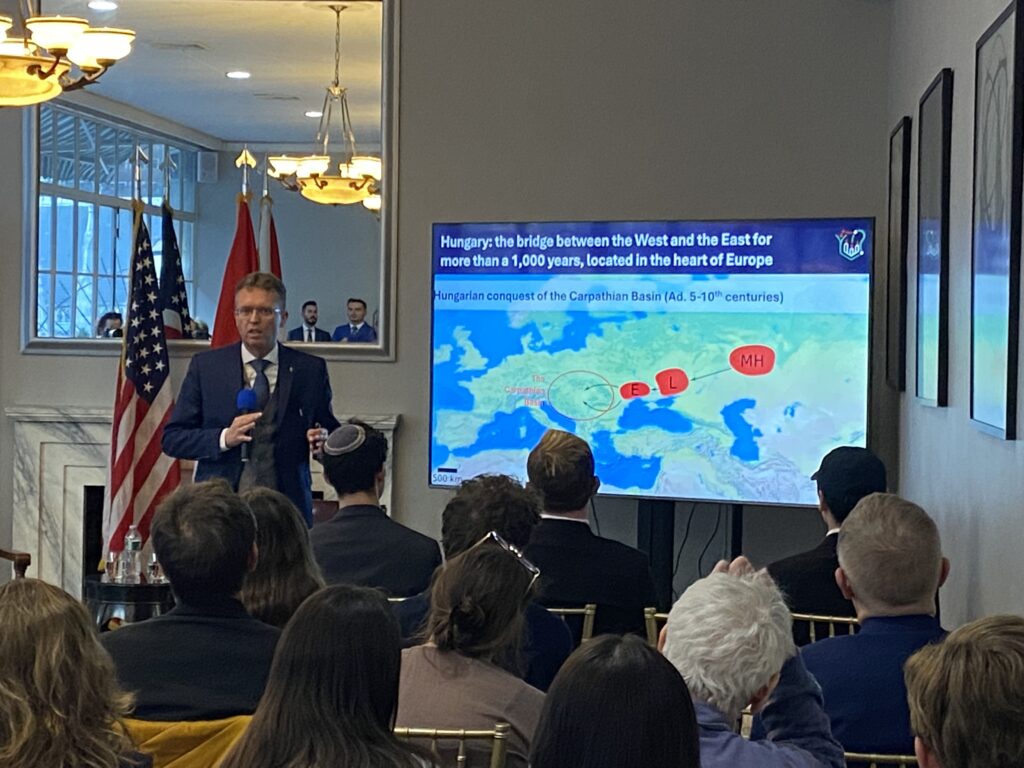
The minister informed the audience that in the last couple of years, many iconic cultural buildings were renovated, renewed, or newly built in Hungary; the Liget Project in Budapest being the grandest cultural infrastructure development program in Europe, including the newly-built Museum of Ethnography and the House of Music Hungary. He explained that after World War II, many of the buildings of the Buda Castle, an iconic part of Budapest, were bombed to shatter, but recently they were renewed because Hungarians find it important to protect their cultural heritage. As said, cultural renovations took place not just in Budapest (for example, the Museum of Fine Arts, the Hungarian State Opera, the Liszt Ferenc Academy of Music, the Eiffel Palace in Budapest), but all over the Carpathian Basin (e.g., the Reformed Church in Kolozsvár (Cluj-Napoca, Romania)). He also mentioned that the famous Hungarian film industry is nowadays number one in Europe: Hungary managed to attract several big American productions that were shot (fully or partly) there, but Hungary is focusing also on promoting Hungarian movies, being aware of the proverb: ‘If you don’t tell your own story, no one will tell it instead of you’. It follows that ‘our responsibility is to tell our story to the world,’ he said.
Regarding competitiveness in higher education, the minister emphasized that in 2021 Hungary transformed many of its major institutions, from the old state-owned model, which was a remnant of the communist era, to a new, competitive operational model with performance-based funding contracts. As he highlighted, the restructuring of the vocational training system has also taken place because ‘profession is important for the Hungarian labor market’; therefore, the Hungarian government invited stakeholders from the labor market to give advice on how to renew vocational training activities. Thus, they managed to have several positive outcomes in the new higher education system, producing more corporate income and patent applications, etc. But the main message is that these reformed universities and vocational training centers have to serve the Hungarian economy and the Hungarian society, he emphasized.
Prof. Hankó highlighted that Hungary also achieved significant progress in the research and innovation ecosystem in the last decade, reaching +8.7 score on the European Innovation Scoreboard since 2017; triple increase in research and development (R&D) funding and double increase in R&D personnel compared to 2010; and 50 per cent increase in terms of the number of PhD students compared to 2014. We are moving in the right direction, he concluded, adding that it’s important to have good manufacturers, but Hungary wants to have inventors too—that’s why the university system has been restructured. However, the key to our future is demographics, because Hungary is a family-friendly country, family being very important, or rather important, to all Hungarians, the minister highlighted. This is the reason for changing the whole family protection policy in the past 15 years, he added. As a key result of these new policies, Hungary ranks first in terms of increasing the fertility rate between 2010 and 2023; the number of marriages has doubled, the divorce ratio declined by around 29 per cent, while the abortion ratio declined by almost 50 per cent over the past 10–15 years.
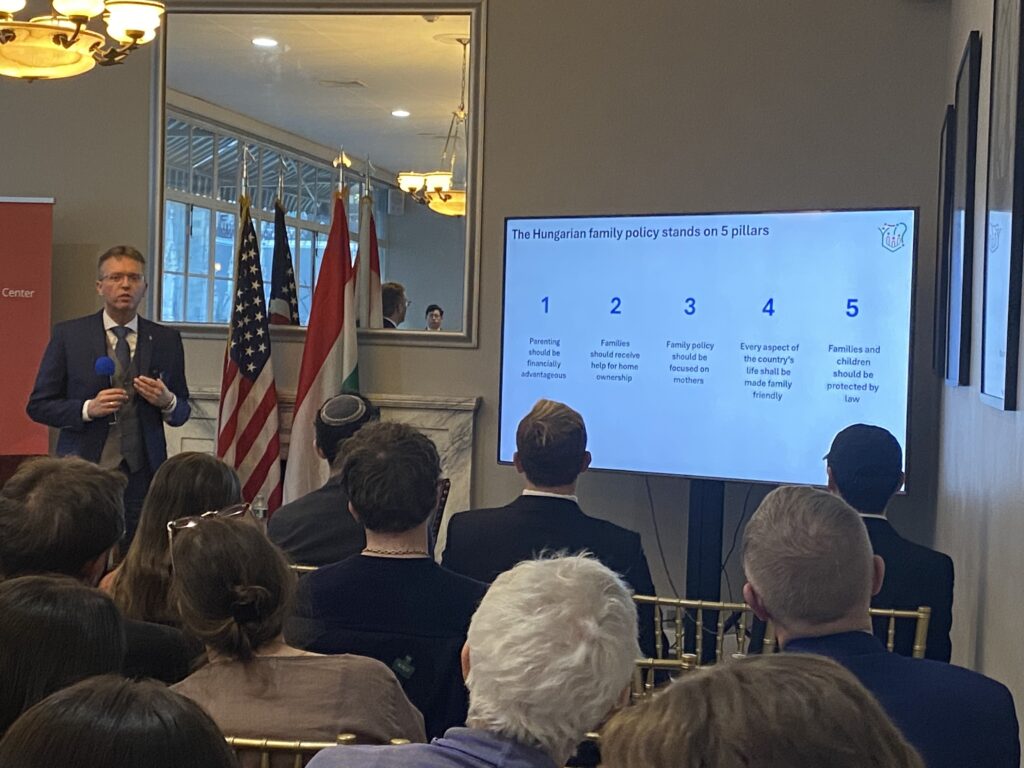
Finally, the minister explained the five pillars of Hungarian family policy: parenting should be financially advantageous; families should receive help for home ownership—as Hungarians like to live in and 90 per cent of them actually live in their own homes—; family policy should be focused on mothers—as the key player in a family—; every aspect of the country’s everyday life should be made family friendly; and families and children should be protected by law. Based on that, the key family policy measures are related to:
- young people (e.g., no personal income tax under 25, zero interest on student loans after vocational training and during university, and repayment deferral or partial release based on the number of children; free language courses, etc.);
- young couples (e.g., baby expecting subsidies under 35; no personal income tax for mothers under 30; eliminating student loans of mothers);
- families with small children (e.g., infant care fee; 70 to 100 per cent of previous wage is paid as childcare allowance until the child is three years old, which is a tax-free benefit; and mothers can even work while being recipients of this subsidy);
- families with children (e.g., there is no personal income tax for mothers with two or more children; family tax allowance);
- housing (e.g., limited energy and utility fees, subsidized loans for purchasing a new home, and cash grants for families living in the countryside);
- children’s well-being (free kindergarten from age three, free meals and free textbooks for children, free public transport under age 14, and free vacation opportunities);
- older people (e.g., early pension after 40 years of service for women; thirteenth month pension once a year, free transport, and VAT refund for some basic food products).
We protect families because we want to protect children, who represent the future, concluded the Hungarian minister in his presentation.
Related articles:


